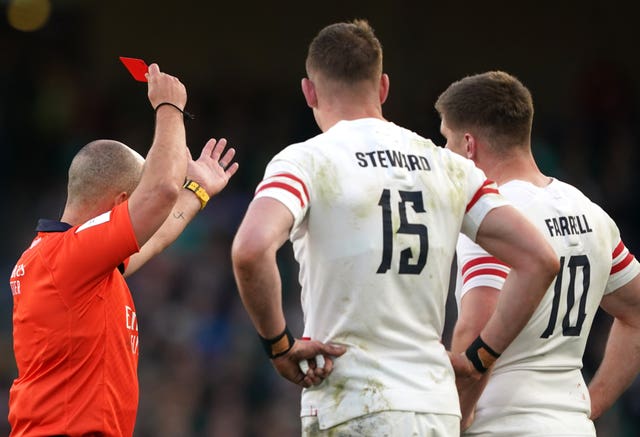
Ireland were crowned Grand Slam champions with a hard-fought victory over England in Dublin, bringing to a close a captivating Guinness Six Nations.
Here, the PA news agency examines five things learnt from the tournament.
The table doesn’t lie
The final standings.#GuinnessSixNations pic.twitter.com/6CVRv49oje
— Guinness Six Nations (@SixNationsRugby) March 18, 2023
The final Six Nations table mirrors the global rankings, providing an accurate picture of the balance of power in Europe. Ireland and France will lead the northern hemisphere’s charge at the World Cup this autumn, Scotland are a quality outfit but not equipped to topple the giants, England and Wales are mired in crisis and rapidly-improving Italy just lack the composure at critical moments needed to be truly competitive. As a spectacle the 2023 Six Nations delivered lavishly with the round-two collision between Ireland and France international rugby at its thunderous best.
Ireland and France carry the flag
Merci à tous pour votre soutien incroyable pendant ce tournoi Hâte de vous retrouver en septembre… 💪🏼🇫🇷Merci et bravo à tout le groupe 💙Congrats @IrishRugby 👏🏼👏🏼👏🏼#FRAPDG pic.twitter.com/lFJUkLYC1M
— 𝗔𝗻𝘁𝗼𝗶𝗻𝗲 𝗗𝗨𝗣𝗢𝗡𝗧 (@Dupont9A) March 18, 2023
Europe has never been better positioned to produce a second World Cup winner after England’s vintage of 2003, but important questions still hover over both the main contenders. Ireland showed against England that they possess the resolve to match their tactical precision, but can they overcome a history of peaking before the global showpiece to the point they have never progressed beyond the quarter-finals? And France are also carrying psychological baggage as while worthy favourites, there remains a gnawing doubt over their ability to cope with the pressure of performing at a home World Cup that was given fuel by their wobble against Scotland in round three.
England in the doldrums

Steve Borthwick’s men climbed off the canvas and came out swinging against Ireland, showing the resilience that was missing in their record home defeat by France a week earlier. Appetite for the fight was the minimum requirement in Dublin and they battled themselves to a standstill, repairing some of the damage inflicted at Twickenham. But with no more competitive games until the World Cup, Borthwick faces the impossible task of addressing the myriad shortcomings left by the Eddie Jones era. On the plus side the set-piece has improved, but overall this Six Nations has exposed the depth of English rugby’s malaise.
Sexton strides the Six Nations pantheon

As Johnny Sexton limped off apparently injured during the act of stopping Jamie George from scoring a try with typical disregard for self-presentation, the Aviva Stadium rose in standing ovation for one of the all-time greats. It was fitting that the 37-year-old fly-half signed off by replacing Ronan O’Gara as the Championship’s leading points scorer of all time and he remains Ireland’s single most influential figure heading into the World Cup. Antoine Dupont confirmed his status as the sport’s foremost player by running rings around England and Wales in a dazzling finish, while Finn Russell amply illustrated his own genius, but this tournament belonged to Sexton.
Red card divide

It was an opinion-dividing decision to set the alarm bells ringing for the World Cup as Freddie Steward was sent off for catching Hugo Keenan’s head with his elbow as he turned to avoid contact. There was not a hint of malice from one of England’s most affable characters, but as Jaco Peyper meticulously worked through the head contact protocols, it was clear the South African referee had no option but to to reach for the red card. Cue howls of protest along the lines of ‘the game’s gone soft’ and ‘it was a rugby incident’, but Steward’s departure was inevitable given the zero tolerance approach taken to head contact. For all that, the sport collectively holds it breath that a similar incident does not take place in the World Cup final when the fallout would be seismic.


Why are you making commenting on The Herald only available to subscribers?
It should have been a safe space for informed debate, somewhere for readers to discuss issues around the biggest stories of the day, but all too often the below the line comments on most websites have become bogged down by off-topic discussions and abuse.
heraldscotland.com is tackling this problem by allowing only subscribers to comment.
We are doing this to improve the experience for our loyal readers and we believe it will reduce the ability of trolls and troublemakers, who occasionally find their way onto our site, to abuse our journalists and readers. We also hope it will help the comments section fulfil its promise as a part of Scotland's conversation with itself.
We are lucky at The Herald. We are read by an informed, educated readership who can add their knowledge and insights to our stories.
That is invaluable.
We are making the subscriber-only change to support our valued readers, who tell us they don't want the site cluttered up with irrelevant comments, untruths and abuse.
In the past, the journalist’s job was to collect and distribute information to the audience. Technology means that readers can shape a discussion. We look forward to hearing from you on heraldscotland.com
Comments & Moderation
Readers’ comments: You are personally liable for the content of any comments you upload to this website, so please act responsibly. We do not pre-moderate or monitor readers’ comments appearing on our websites, but we do post-moderate in response to complaints we receive or otherwise when a potential problem comes to our attention. You can make a complaint by using the ‘report this post’ link . We may then apply our discretion under the user terms to amend or delete comments.
Post moderation is undertaken full-time 9am-6pm on weekdays, and on a part-time basis outwith those hours.
Read the rules here